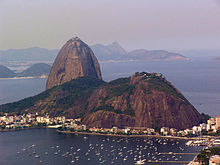Local mountain

A local mountain of a place or a property is a prominent mountain in its immediate vicinity, the soft image of the place. If an elevation is located directly in the city, one speaks more of a city mountain . You look up to the city's local mountain, but it has more the function of looking down on the city from it. That is why many local mountains are also accessible by mountain railways or cable cars .
The local mountain of a city does not have to be on its boundary: The Pfänder , the local mountain of the city of Bregenz, is in the area of the municipality of Lochau and the highest peak of the Pilatus, the local mountain of the city of Lucerne, is even just outside the canton of Lucerne .
About the terms


A local mountain can be both an important local recreation area in the city or town, as well as a visual identification carrier (such as "The mountain above the city"). The city mountain can be the reason for the settlement, as a hilltop settlement or as a fortification site . Because the combination of the city mountain and the river results in an excellent transition location - a solid bridge was possible through the surrounding rock and at the same time its protection was ensured on the elevation - today's city mountains are of historically outstanding strategic importance. The situation is analogous for good natural seaports. Conversely, the local mountains around a city in the Middle Ages served as a forest (and thus a source of building and heating raw materials) as well as grazing land for the resident rulers , their officials and the direct city citizens , so they were part of the real estate of a city from an early age. Since the last third of the 19th century ( Wilhelminian era ), when the transport difficulties ceased, the city and nearby Hausberg locations have been a clear, quiet, and also above the smog of the city, clean and green belt residential area, and are often through to this day Health resorts , parks or residential areas .
Both expressions, Hausberg and Stadtberg , have also become place names for mountains ( oronyms ) or the settlements on them ( settlement name ), often also the reason for place names on -berg .
The term Hausberg is originally to be taken literally, Hausberg in the Alpine region is the mountain of a farm or property on which its pastures / Alps are located. Usually several farms or smaller settlements share a mountain. In a wine-growing region, Hausberg is often the name of an important winery, see Weingut Hausberg , Grundhof with Nieder- or Hausberg or Haus Reinhardtsberg (formerly Hausberg) .
Similarly, when referring to mountains that are close to refuges in the mountains and are easily accessible from them, one speaks of the hut's local mountain or hut mountain - some of the high mountain huts were built especially for the purpose of climbing this summit, for example today's Hofmann hut in Heiligenblut was originally - as one of the first high alpine pure mountaineering huts - built in 1834 for Archduke Johann to climb the Großglockner .
In Austria, Hausberg is the name for a simple defensive structure on an artificially created hill (see Motte ).
See also
- List of famous local mountains
- Acropolis (castle hill of ancient cities)